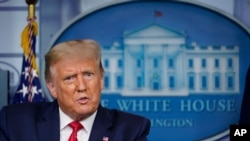“I didn’t lie,” U.S. President Donald Trump bluntly responded at a White House news conference Thursday after a reporter asked him, “Why did you lie to the American people?”
The question from ABC News White House correspondent Jon Karl came in the wake of audio released by journalist and author Bob Woodward, to whom Trump acknowledged early this year he wanted to play down the threat from the coronavirus.
“I don’t want to jump up and down screaming, ‘Death. Death,’” Trump replied on Thursday to justify intentionally misleading the country about the severity of COVID-19.
He called Karl’s question disrespectful and took queries from only two other reporters before abruptly departing the briefing room.
The president also sought to calm the uproar about revelations from the 18 interviews he gave to Woodward, which appeared in Woodward’s new book, Rage.
Trump said if Woodward thought his comments on the coronavirus were so bad, “he should have immediately gone out publicly,” instead of waiting many months to release the tapes.
“I wanted to always play it down,” Trump is heard saying on the recording about the coronavirus, taped on March 19.
The next day, in response to a White House reporter’s question during a live news conference, Trump denied that his minimizing of the risk was giving Americans a false sense of security.
Fewer lives would have been lost, according to Democratic Party politicians and many public health officials, if the president had emphasized early on the seriousness of the coronavirus. Trump repeatedly claimed early in the year that the coronavirus was no worse than influenza, would soon go away and that the federal government had the situation under control.
Trump is engaged "in reckless disregard of the lives and health and well-being" of the American people, Sen. Kamala Harris, Democratic vice presidential candidate, said Thursday at an event in Florida. "I find it so outrageous."
COVID-19, the disease caused by the coronavirus for which vaccines are currently under development, has killed 191,567 people in the United States, according to Johns Hopkins University’s Coronavirus Resource Center – the largest number reported by any country. Nearly 6.4 million infections of the 28 million worldwide are in the United States.
According to Woodward’s book, as the virus started to sweep from China throughout the world, national security adviser Robert O’Brien told Trump in a January 28 White House meeting, “This will be the biggest national security threat you face in your presidency. This is going to be the roughest thing you face.”
Woodward, a Washington Post associate editor, said deputy national security adviser Matthew Pottinger agreed with O’Brien’s assessment.
Yet Trump publicly minimized the threat. Ten days after the White House meeting, he called Woodward and said he thought the situation was far more frightful.
“You just breathe the air, and that’s how it’s passed,” Trump said in a February 7 call. “And so, that’s a very tricky one. That’s a very delicate one. It’s also more deadly than even your strenuous flu.”
“This is deadly stuff,” the president repeated for emphasis.
The revelations come less than eight weeks before the November 3 presidential election between Trump and his Democratic challenger, former Vice President Joe Biden.
Biden, on a campaign trip to the Midwestern political battleground state of Michigan on Wednesday, assailed Trump’s performance in dealing with the coronavirus.
“He knowingly and willingly lied to the American public about the threat posed to the country for months. ... He failed to do his job on purpose,” Biden said. “It’s beyond despicable.”
Trump is scheduled to make a campaign speech in Michigan later Thursday.
Political management professor Todd Belt at The George Washington University said revelations from the book about Trump's response to the coronavirus could provide political ammunition for both Republicans and Democrats.
"Of course, the Republicans will say, 'Look, he was providing leadership. He didn't want people to panic,’” Belt told VOA. “Whereas the Democrats will say, 'Look, this was a poor decision, and it made the problem worse.' So, I think people will probably interpret this part through the same partisan lenses.”
Woodward is best known in American journalism for joining Post reporter Carl Bernstein in uncovering the Watergate political corruption scandal in the 1970s that led to President Richard Nixon’s resignation.
The new Woodward book tracks the Trump administration’s missteps in dealing with the pandemic and touches on numerous other controversies during Trump’s nearly four years as president.
“Trump never did seem willing to fully mobilize the federal government and continually seemed to push problems off on the states” to deal with the pandemic, Woodward wrote. “There was no real management theory of the case or how to organize a massive enterprise to deal with one of the most complex emergencies the United States had ever faced.”
Woodward said infectious disease expert Dr. Anthony Fauci, often the administration’s public face answering questions about the COVID-19 disease, at one point told others that Trump “is on a separate channel” and unfocused in meetings, with “rudderless” leadership.
Ken Bredemeier and Patsy Widakuswara contributed to this report.





